Using potassium permanganate for tomatoes
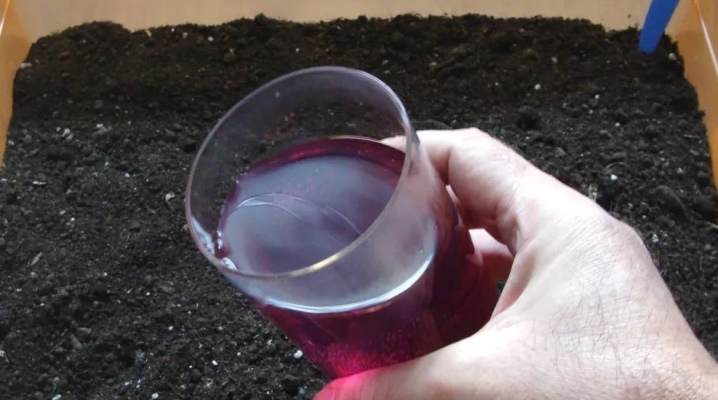
Potassium permanganate is an antiseptic. It oxidizes in air and effectively destroys pathogenic bacteria and pathogens of certain infectious diseases. The substance contains potassium and manganese - these are two trace elements that are necessary for plants to develop correctly. Some part of manganese is concentrated in manure and wood ash. Also, soil contains such trace elements, but cultures cannot get them. The mixture of potassium and manganese enhances the use of potassium permanganate for good tomato productivity. At the same time, the fruits processed by it will not cause harm when eaten.
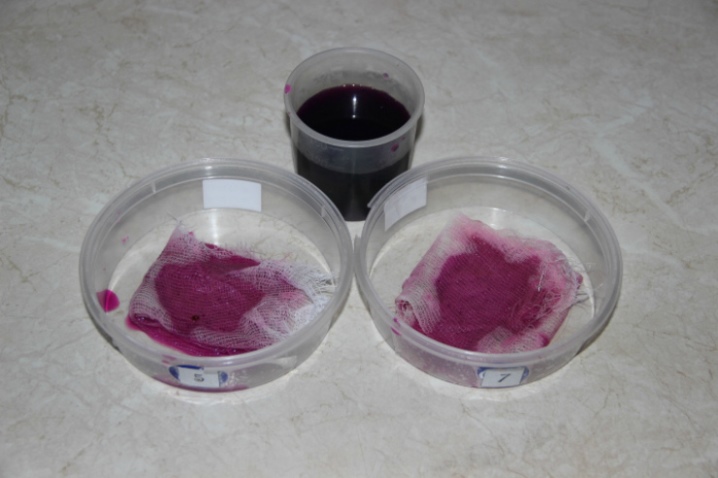
What is it used for?
Farmers have long been accustomed to using potassium permanganate for growing crops, including tomatoes. The antiseptic is inexpensive, and its effectiveness in the fight against many diseases of tomatoes is high.
Here are some of the health benefits of the substance.
- Since potassium permanganate is a disinfectant, processing with a composition based on it can reduce the number of microorganisms that inhibit the vegetation of the plant. But with such usefulness, there is also a certain disadvantage. As a rule, upon contact with manganese, damage is done to the beneficial microflora.
- Once in the soil, a substance triggers a chemical reaction, releasing highly reactive oxygen. When combined with various substances, ions are formed in the substrate, contributing to the healthy development of the root system.
- Manganese and potassium ions have a beneficial effect on the soil and green parts of plants.
- The treatment of tomato crops with a liquid with manganese crystals diluted in it supplies them with the necessary feeding and disinfects them at the same time.
- Before transplanting and at the stage of pinching, leaves are removed from the culture and unnecessary shoots are cut off. If it is treated with a pink manganese solution, the drying time of the wounds is reduced, and the plant will be less likely to catch an infection.
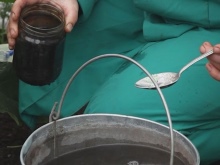
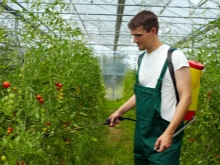
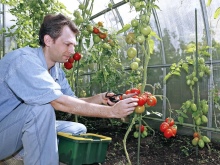
Despite the importance of the influence of potassium permanganate on a healthy crop, it must be used with a strict dosage. Excessive soil treatment with a solution of potassium permanganate inhibits plant crops.
Over-watering before sowing and planting seedlings will not benefit the yield. At the same time, with a lack of manganese, the leaves are threatened with the appearance of interveinal chlorosis.
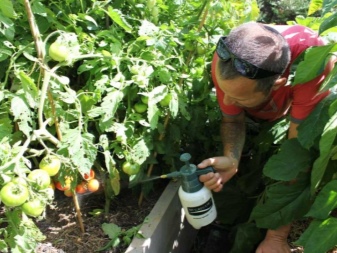
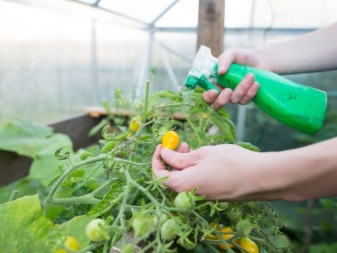
How to process seeds?
In order to grow healthy fruits, it is important to carry out disinfection already at the pre-sowing stage - by treating the seeds. We are talking specifically about the method of disinfection with potassium permanganate. With the prophylactic purpose of processing the seed, the preparation of a 1% solution from 1 gram of manganese will help. The crystals are dissolved in 1 liter of heated water (you can boil and cool the liquid to a suitable stage for greater disinfection).
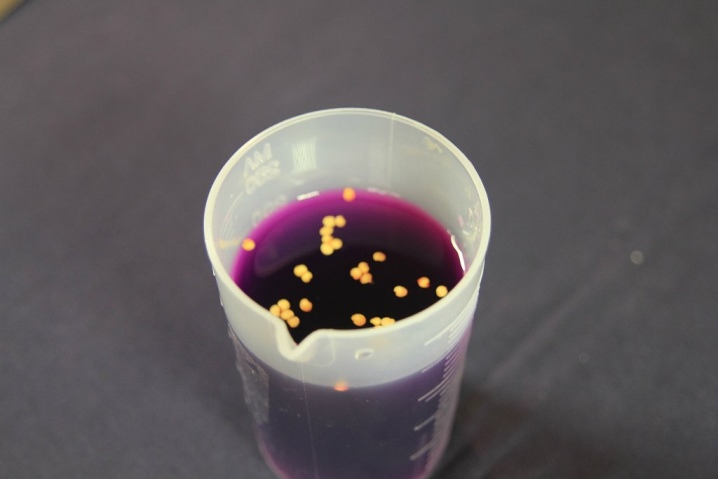
Prepared tomato seeds must be wrapped in gauze or cotton cloth and immersed in a manganese solution for a third of an hour. A longer stay of seeds in the solution is not recommended. Then the seeds are washed with water directly in gauze and laid out to dry.
Experienced agronomists are able to visually determine the required concentration of potassium permanganate. A beginners will need to proceed with the utmost care, adhering to a specific proportion. Usually potassium permanganate is sold packaged in 3 or 5 g.You need to navigate based on the mass and amount of water.
Seed treatment alone will not be enough. There is a possibility that disease-causing spores can be found on the container and in the soil. A bucket of water is put on fire and brought almost to a boil, then 5 grams of crystalline potassium permanganate is dissolved in it. After thorough mixing with pink-colored water, the containers and equipment are treated. They do the same with the soil.
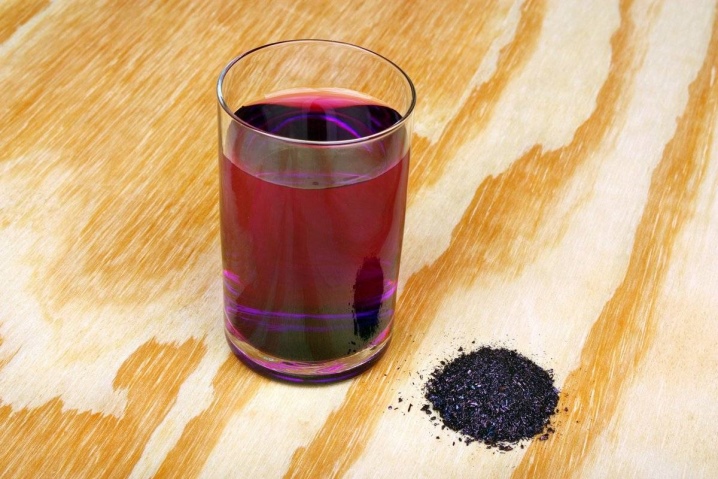
Application for seedlings
Processing tomatoes with diluted potassium permanganate does not consist solely in preparing seeds and spraying them. It will be correct to water the crops at the root. For the health of the seedlings, it is necessary to spill the area twice with a weak manganese solution and irrigate the plants. To obtain the appropriate solution, 10 liters of water and crystals of manganese potassium in a dose of 5 g are required. Typically, soil and tomato plantings can be watered every 10 days.
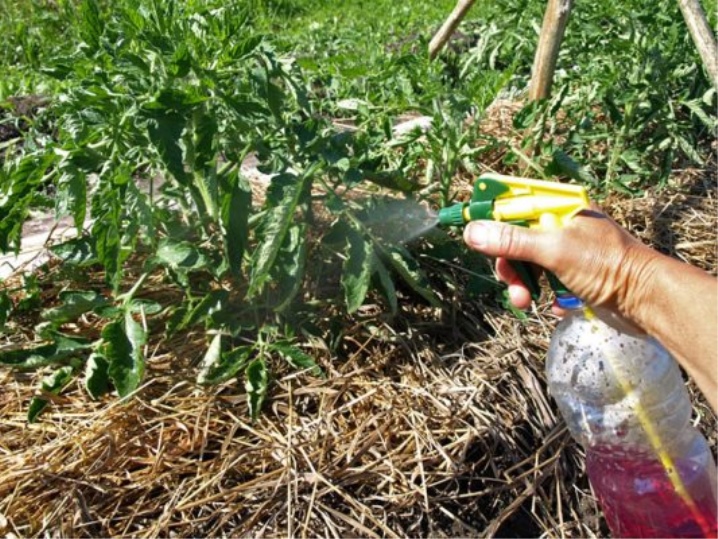
Processing in the ground
Preventive treatments with manganese solution are carried out in the open field three times during the entire growing season. The same applies to indoor cultivation.
After landing
The first processing of tomatoes takes place 5 days after the definition of seedlings in the ground. For this purpose, it is necessary to dissolve the manganese in water to obtain a pale pink liquid. It will be used to prevent late blight. A solution is prepared in the following proportions: 0.5-1 g of crystals of an antiseptic substance are added to a bucket with 10 liters of water.
It is necessary to pour 0.5 liters of such a solution under all the tomatoes. Then add the same pinkish solution to the spray bottle and spray the tomatoes. A standard garden watering can is also suitable for watering. Only in this case will you have to act more actively.
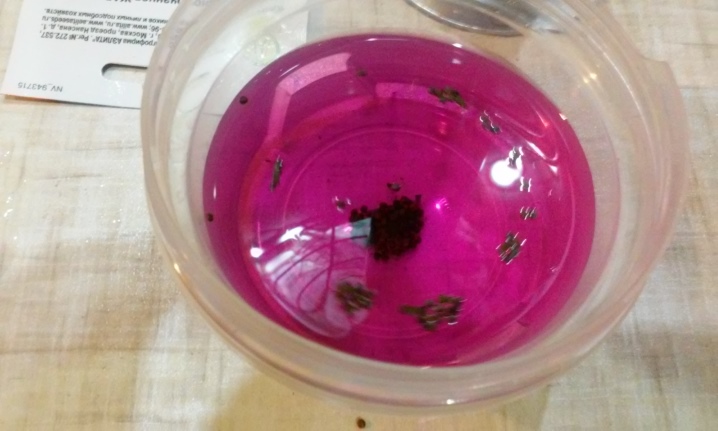
It is important to process all the leaves, stems of the plant and every shoot on it. These manipulations are carried out in the early morning so that all the droplets have time to dry by sunrise.
Otherwise, there is a possibility that the green mass will get burns under the sun's rays. With proper processing, the plants are provided with root and foliar feeding with manganese and potassium, as well as good protection against late blight.
In June
Subsequent processing will be required when flowers appear on the fresh brushes. But first you have to feed the crops with organic fertilizers or use superphosphate for this purpose. Green spaces should be sprayed with a low concentration manganese solution. Such processing for tomatoes is traditionally scheduled for the middle of June.
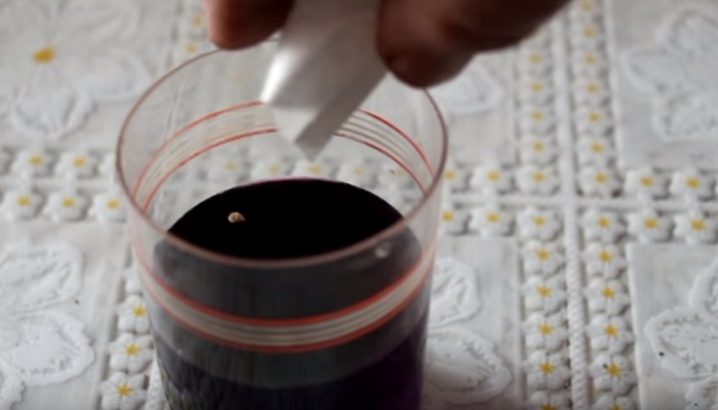
When the fruits begin to take shape, the crops need to be fed with manganese and potassium. In addition, it was during this period that late blight often appears on tomatoes. It is no secret that from the leaves it instantly passes to tomatoes, manifesting itself with brown spots and rot. Reprocessing with pink liquid is a vital necessity for tomatoes. Spraying has a positive effect not only on the quality characteristics of the tops, but also on the condition of the fruits themselves.
In July and August
Around the middle of summer, plants may be threatened with the appearance of brown spot. For spraying the fruit, you can use a recipe that experienced farmers always adopt. The time for using the solution for disinfecting tomatoes begins in mid-July and ends in the fruiting phase. The following recipe will be effective.
In a meat grinder (or in a blender), grind the teeth and fresh arrows of garlic (in the amount of 300 g). The mass should be added to a two-liter saucepan filled with water and left under the lid for 5 days. After the end of this period, the fermented garlic gruel is filtered and poured into a 10-liter container with water. 1 g of manganese crystals is poured into the liquid, dissolve them and spray all the tomato plantings.
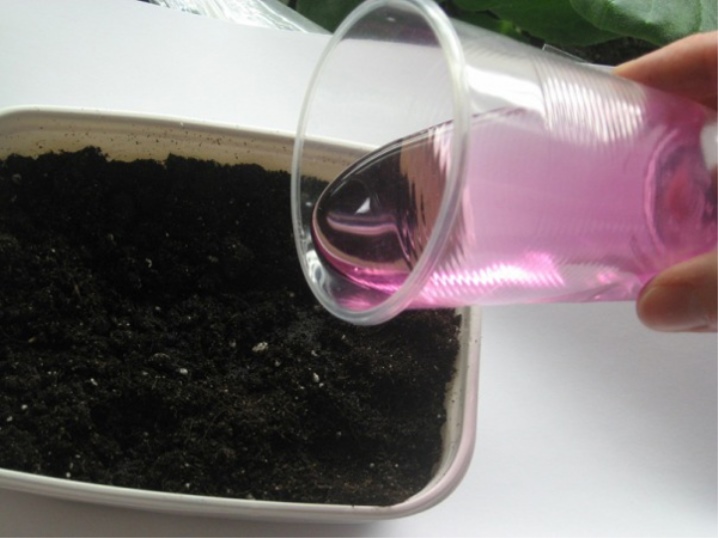
Spraying with this solution on tomatoes is allowed every 10 days. Garlic is saturated with phytoncides, which, together with potassium permanganate, actively fight against spores of fungal diseases.Prevention with spraying tomatoes with a weak manganese solution carries a special mission in the last summer month, when cold dew settles on the plants in the morning. It is often the main cause of late blight on plants.
Useful Tips
It is no secret that even the cold is not able to destroy fungal spores in the earth layers and the greenhouse. As a preventive measure, it is also recommended to use manganese dissolved in water. In this case, the solution should be a deep crimson color. They need to process the walls and ceiling of the greenhouse structure. Potassium permanganate is diluted in practically boiling water, then the entire surface of the greenhouse is sprayed with this solution, including the slightest cracks. While the solution is hot, it is necessary to spill the soil. Then the entrance to the greenhouse is closed.
The prolonged rainy season harms greenhouse plants and outdoor tomatoes. In the summer, you need to spray the greenhouse outside with a strong raspberry solution. He also processes the path inside the greenhouse and the one that leads to the entrance. Such prevention is necessary to prevent late blight. It will allow you to get rid of the destructive spores transferred to the greenhouse on shoe soles.
If tomatoes are to be grown in open ground, before planting, they are watered with boiling water with potassium permanganate diluted in it. At the slightest hint of phytophthora, some agronomists process not only the planted plants, but also the tomato crop itself. It is most important to carry out this work with green and pinkish fruits, especially if their collection was preceded by unfavorable weather.
For the prevention of diseases, potassium permanganate in crystals in an amount of 1 g is shaken in 10 liters of warm water. The water temperature should not exceed 40 degrees. Put green tomatoes in the solution for 10 minutes. Then they need to be rinsed with clean water, wiped thoroughly and folded for ripening. If you are not sure that you managed to hit all the disputes, the fruits should be wrapped in newsprint. It is important to do this with all the fruits.
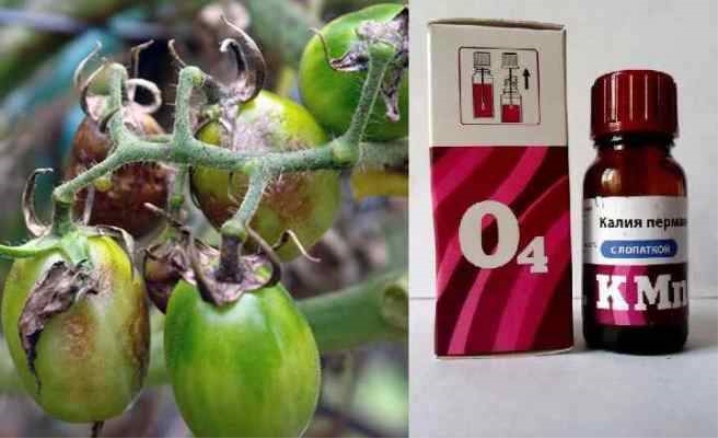
One of the advice to farmers for summer residents will be information that such treatment is not recommended on acidic soils. As for the plants themselves, it is necessary to maintain a specific dosage of manganese potassium. Otherwise, it is easy to burn the leaves and root system. If the tomatoes already have leaves with traces of the disease, the dosage of potassium permanganate in the liquid should be increased.
Potassium permanganate is appreciated not only by gardeners in private plots. Scientists and professional agronomists also claim its unique antiseptic qualities.
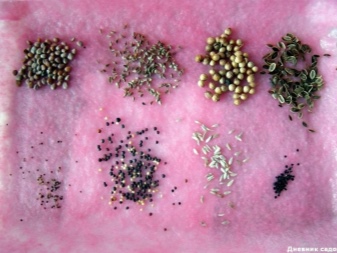
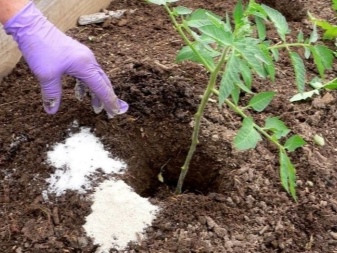













The comment was sent successfully.